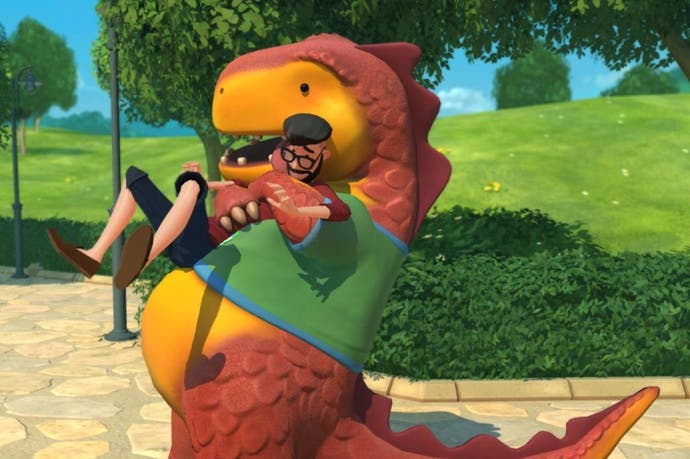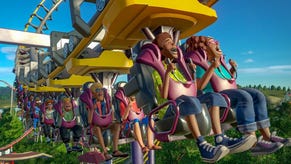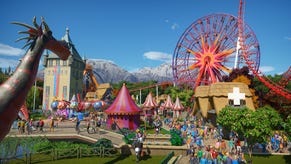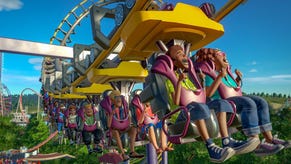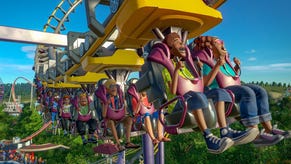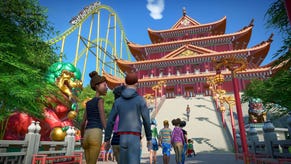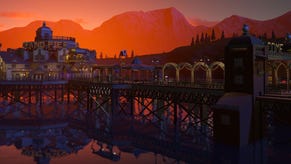Planet Coaster review
Fairground distraction.
If you've ever been to Disneyland, California, you'll probably know about the so-called stretch rooms that kick off the park's legendary Haunted Mansion ride. On entering Disney's spooky old house, you're ushered into a windowless chamber that begins to change almost imperceptibly as your disembodied host bids you welcome, elongating so that its once perfectly innocent paintings stretch into ghoulish tableaux revealing the gristly fates of the mansion's inhabitants. And then, with a flash of lightning, it's onto the ride proper.
It's a wonderful scene-setting moment, full of deliciously creepy ambience, but really that whole sequence serves one purpose alone: to distract you while the elevator floor you're standing on creaks and groans its way out of the mansion facade (built way before Disney knew what the final ride would entail), and into the far more spacious main show building, tucked safely out of sight behind a hill. It's a neatly thematic solution to a very practical problem, and indicative of the lengths that Disney's imagineers will go to to ensure that their park's spell is never broken.
That to me is the essence of theme park design, and it's why most theme park games have always fallen a little short in my eyes. Games like Bullfrog's Theme Park and the seminal Rollercoaster Tycoon series certainly tried to sate the whims of budding park designers and engineers, but the obvious technical limitations of the time meant that, even once each series had transitioned to full 3D, your creations were still fairly abstract, rudimentary entities, allowing for only very limited attention to detail.
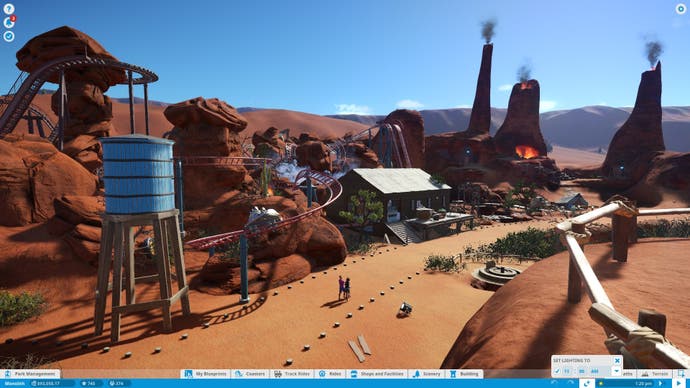
By contrast though, Planet Coaster is an embarrassment of riches when it comes to park customisation. Yes, it has all the classic management elements of the genre - you'll build new rides, deploy staff, and constantly fiddle with prices to appease to your ever-fickle paying customers - but Planet Coaster's main focus is on delivering an unprecedented level of creative control, finally enabling insatiable tinkerers like me to marry functional park design with dazzling degrees of theme and flair.
Admittedly, on a fundamental level, Planet Coaster's core construction and customisation tools are nothing new; you can design coaster tracks, shape the landscape, install practical items like bins, benches, shops, and then theme it all up with topiary and assorted bits of scenery. In terms of execution and design potential, however, they're a revelation.
Planet Coaster's toolset is tactile, intuitive and incredibly powerful, making it absurdly easy to create complex, richly detailed parks. Coaster design merely requires you to drag around track segments in order to adjust curves, elevation and banking, while landscaping is simply a matter of geological sculpting: you can shape hills, dig out pits and tunnels, roughen edges, smooth corners, and raise water levels, all with an enormous degree of precision, simply by pulling and prodding the earth. Building, meanwhile, is no more complicated than snapping pre-fabricated parts together, and the impressive array of beautifully designed building blocks and scenery (covering modern, pirate, sci-fi, western and fairytale themes) means that there's almost limitless scope for creativity.
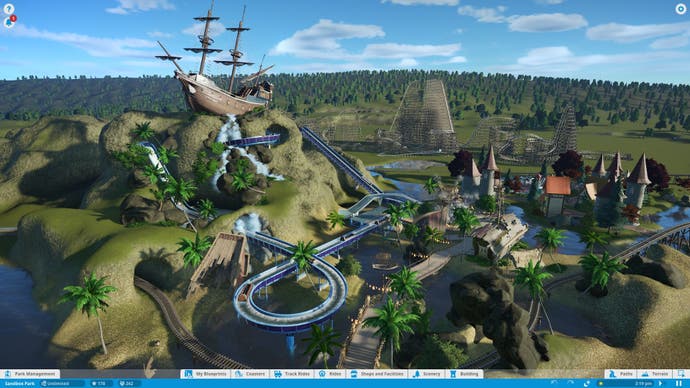
You can thread your log flume through the peaks of an alpine mountain, for instance, sending it plunging into misty caverns where giant animatronic dragons await; you can build towering fairytale castles with shops on every floor; you can skilfully transition from tropical lagoons to dusty wild west towns; you can flex your coaster design skills, mastering the unique physics of hanging coasters, wing coasters, wooden coasters and more; you can obsess over mood lighting when night falls, pump emotive music and ambient sound effects through speakers to liven your queues, even create elaborate set-pieces that unfurl as your rides hit key points along the track. The possibilities are endless.
And even if you don't have the inclination or patience to deal with park design at a macro level, it's still possible to assemble gorgeous-looking parks by using the prefabricated blueprints accessible through the game's well-designed interface, or from the extensive list of (incredibly impressive) fan-made creations found on Steam Workshop. You only need to look at screenshots to appreciate just how powerful the game's tools really are.
That's no more apparent than when you switch to first-person view and begin to explore your park at ground level. It's here that Frontier Development's exceptional audio-visual design and slavish attention to detail truly shines. Wandering among your elaborate creations as the sun slowly sets, hopping aboard any one of the wonderfully distinct rides, and watching as punters giddily emote at the world around them is utterly magical; everything comes together with such joyful precision that it's hard not to be spellbound.
As a design tool, Planet Coaster's ambitions and implementation are near-faultless; unfortunately, however, its management side doesn't impress nearly as much. It's a curiously unambitious, simplistic and often retrograde part of the game, dramatically at odds with the genuinely groundbreaking creation side. Meaningful business decisions are limited to price adjustment, staff management (hiring, training and assigning specific tasks to janitors, mechanics and entertainers), ride deployment, research and marketing - all of which is fine, but certainly nothing new.
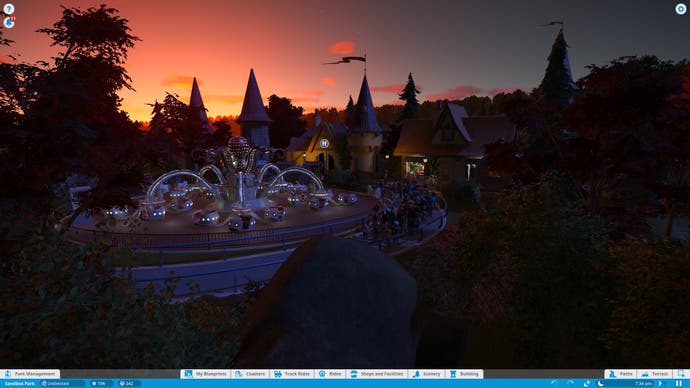
Infrastructure management is just substantial enough to provide a framework for your ceaseless expansion, but it's familiar to the point of feeling a little stale; if you're an old-hand at the genre, there are few situations that the simulation can deliver that you won't have seen, and dealt with, countless times before. Guests complaining they're thirsty? Slap down a drinks shop. Park too dirty? Hire janitors and place some bins. Queue too boring? Smother it in scenery. It's disappointingly rote, and there's minimal scope to experiment with new and interesting strategies.
That's particularly problematic if you're not sufficiently sold on the idea of endless creative tinkering; when park management isn't broken up with bouts of furious building, the experience can start to feel frustratingly passive. Most of your interactions with the simulation are inevitably reactive, and there's very limited agency where infrastructure management is concerned.
This is especially disappointing to see when other theme park sims are attempting to make management feel more proactive. Early access game Parkitect, for instance, makes a real effort to merge park design and business management in meaningful ways, forcing you to optimise your park layouts not just to impress your guests but to maximise infrastructure efficiency - using staff-only routes to get your workers around more quickly, or placing storage depots in strategic positions so that stock can reach shops before their shelves are empty.
To Frontier's credit, it does at least try to shake up Planet Coaster's well-worn formula: alongside Sandbox mode and Challenge mode (which requires you to research your own rides and raise your own cash), there's a Career mode which sets you loose across a variety of pre-built parks and challenges you to complete three difficulty tiers of objectives. Even so, park management still feels disappointingly slight, and that's only compounded by a number of conspicuously absent features such as weather and park security - both of which might easily have added more strategic depth.
I suspect that Frontier's ultimate intention with Planet Coaster is to take the kind of iterative, long-term approach that's worked so well for Elite Dangerous, and if that's the case, there's no telling where things will end up in the weeks, months and years to come. As it stands though, Planet Coaster is an experience of two very uneven halves and, as a result, your preferred style of play will dramatically affect your affinity with the game.
As a management sim, Planet Coaster is pretty ho-hum, but as a tool for creation it's a revelation: a powerful, wonderfully compelling (and frighteningly easy) way to lose yourself for hours at a time. If you've any interest at all in theme park design, or if you thrill at the idea of being able realise your every fantastical, architectural whim (even if it's just putting down a bunch of rocks just so), then you'll likely adore Planet Coaster. It mightn't be the ultimate theme park sim for accountants and middle managers, but for the dreamers and the tinkerers, the budding imagineers, there really is nothing else quite like it.
